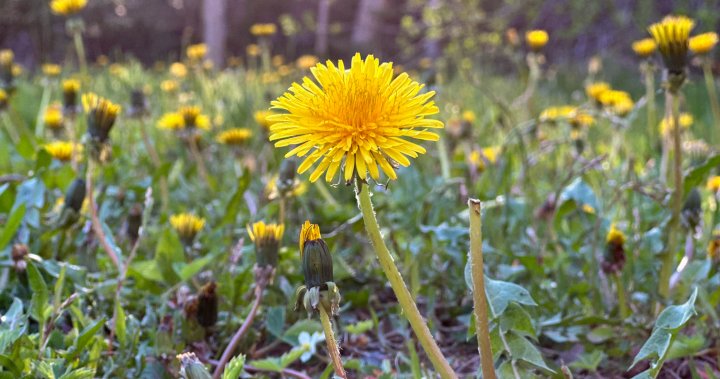As May reaches the halfway point, the effectiveness of “No Mow May” in aiding the native bee population remains a topic of debate. The movement encourages homeowners to refrain from mowing their lawns in the spring to provide more nectar and pollen resources for hungry bees. However, master gardener Richelle Gregg describes the movement as controversial, pointing out that untrimmed grass may not provide nutritional value for native pollinators. She emphasizes the importance of supporting native bee species such as sweat bees, digger bees, and mason bees, in addition to honeybees brought in to support agriculture. Gregg recommends planting native flowers in gardens to support the native bee population and maintain the balance between native and introduced bees to ensure pollination of native plants and species.
Gregg highlights the importance of maintaining areas in yards with native plants for bees and butterflies, and recommends that at least 25% of gardens consist of native flowers like bee balm, goldenrod, and black-eyed Susan. She suggests looking at what grows naturally on the side of the road for inspiration on what plants could be beneficial for the native bee population. Gregg also reminds homeowners to avoid letting grass grow too long before cutting it, as it can stress the grass and result in weed growth. She urges people to do additional research on “No Mow May” before deciding to participate, emphasizing the need for a thoughtful and sustainable approach to supporting the native bee population.
In Truro, N.S., opinions on “No Mow May” vary among residents, with some choosing to continue mowing their lawns for aesthetic reasons. While some residents support the movement, others prioritize maintaining their lawns for personal preferences. Assistant professor Paul Manning from Dalhousie University’s Faculty of Agriculture points out that dandelions, which often grow in untended lawns, may not provide sufficient nutrition for bees compared to other plant species. He stresses the importance of supporting all bee populations, including native bee species that play a crucial role in sustaining a healthy environment and contributing to the food chain. Manning highlights the significance of bees in pollinating crops like blueberries, cranberries, almonds, and apples, which are essential for human health and ecosystem balance.
Manning acknowledges the mixed evidence on the effectiveness of “No Mow May” in supporting pollinators, as plants like dandelions may not offer optimal nutrition for bees. He explains that dandelions can outcompete other plant species that could provide healthier pollen for bee species, impacting their ability to reproduce and thrive. Manning emphasizes the need for people to research and prioritize nutritionally appropriate plants to support the native bee population. He underscores the critical role of bees in pollinating various crops that are essential for human nutrition and ecosystem health. Manning highlights the diversity of native bee species in Canada and their unique nesting habits, emphasizing the importance of providing a supportive environment for all bee populations.
Overall, the debate around “No Mow May” continues, with differing opinions on its effectiveness in supporting the native bee population. While the movement aims to provide more nectar and pollen resources for hungry bees by refraining from mowing lawns, critics like Richelle Gregg raise concerns about the nutritional value of untrimmed grass for native pollinators. Residents in Truro, N.S., have varying views on the movement, with some choosing to continue mowing for aesthetic reasons, while others support the initiative to help bees. Paul Manning stresses the importance of supporting all bee populations, especially native species that play a vital role in sustaining a healthy environment and ensuring the reproduction of plants. Further research and thoughtful planning are recommended to effectively support the native bee population and maintain ecosystem balance.


